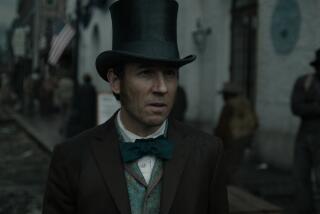MOVIE REVIEW : COMPLEX VIEW OF THE REAL ‘HUEY LONG’
- Share via
When you see the first film clips of the real-life subject of Ken Burns’ documentary “Huey Long” (at the Nuart), it may come as a shock. We tend to think of Long as the archetypal Southern politician, in images set by Broderick Crawford in 1949’s “All the King’s Men”: a beefy bully, brusque and pig-eyed mean, with dollops of snaky charm.
But the Huey Long here is something else entirely. His face is chubby and cherubic, his hair a curly tangle, and his eyes have a wide, wild, elfin glow. He looks more like Frank McHugh than Crawford--and he even makes funny, sinuous, fluttering little hand movements like a ‘30s character comedian, Billy Gilbert or Franklin Pangborn--genial, clownish. But when he speaks, it becomes clear how he seduced an entire state. He’s a magnificent pseudo-homespun orator, alternating folksy tall tales, calculated buffoonery and great rolling tidal waves of rage against his targets: politicians and the super-rich.
One after another, Louisianans past 70--white or black, simple people all--tell us how they loved him; how he built roads, bridges, got their children free lunches and schoolbooks, fought the wealthy who’d been bleeding them dry. They remember him still as their greatest champion and friend. These were the kind of people, 100,000 strong, who lined the rotunda at Long’s state Capitol to file past his coffin after he was shot down in 1935.
And, one after another, other Louisianans (or historians)--better dressed, more mellifluous and genteel--tell us that Long was dangerous, dictatorial, corrupt: that he had to be stopped, that (in the words of Mrs. Hodding Carter) not a day went by “that we didn’t talk about killing Huey Long.”
At first, Long’s foes appear almost too smug and patrician. What if he really was the poor’s best hope, and not the moonshine Mussolini his enemies painted? Then, as more damning evidence accumulates of Long’s power grabs, unscrupulous gut-fighting and crippling obsession with the presidency, it begins to seem like something deeper, darker--a true political tragedy. He seems a man of initial idealism and astonishing capacities, who somehow--through recklessness, fear, booze or corruptions of power--misused them. “First-class brains,” says “All the King’s Men” author Robert Penn Warren of Long. This movie gives ample proof of that--and also of the peculiar traps into which first-class brains can fall.
Burns draws Huey Long so pungently that you can’t help ruminating on the roots of the tragedy. Was Long really a consummate fake? Or was he a man who drew too much energy from his hatred of rich and powerful enemies, fixated on them until he became a twisted mirror of the people he hated most?
Burns is a master of the current historical documentary, the now-familiar mix of archival footage with “talking heads,” and one of the most admirable things about this fascinating film is the way it leaves questions hanging--things to mull over. Long after watching it, you may still be puzzling over the riddle of Huey.
Like all first-rate reportage, “Huey Long” soaks you in facts and perspectives, and then leaves you fairly free to wrestle with the mysteries beneath. (Director Ken Burns will appear at the showing at 8 tonight for discussion.)
More to Read
Only good movies
Get the Indie Focus newsletter, Mark Olsen's weekly guide to the world of cinema.
You may occasionally receive promotional content from the Los Angeles Times.










